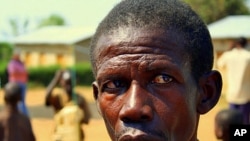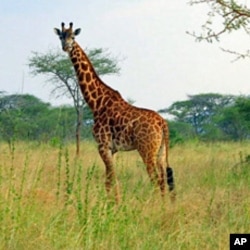Nearly 17 years after civil war and genocide devastated the country, Rwanda is mostly peaceful, and the economy is growing fast. But in the eastern countryside, conflict still rages. Wild animals attack people, while gangs of poachers roam the forest endangering the wildlife and the rangers trying to protect them. Our reporter files this story from Akagera National Park.
Antoine, says he has lived in the village of Humere for three years. He is trying to grow sorghum beans and maize. For three years, he says, animals from the nearby Akagera National Park have raided his crops.
Antoine says he cannot feed his family, and he is thinking of moving on. But in Rwanda, the most densely populated country in Africa, land is scarce.
In the 1990s, as this country reeled from a crushing civil war and the fastest genocide in history, this part of eastern Rwanda, Akagera National Park, was packed with refugees, militants, and farmers whose cows had nowhere to graze.
Now, zebras meander and giraffes loiter in this 1,100-square-kilometer reserve, while buffalo, elephants, crocodiles, and hippos march through the bush or bob in the lakes, and 530 different kinds of birds flutter above.
But locals say although the human war is over, conflict continues in and around the park between animals and people. Buffalo, elephants and hippos wander out, killing and maiming people, and eating crops. People march in, in groups as large as 100 strong, illegally killing everything from hippos to rabbits.
Theogene Semugisha oversees social services for Ndego, a district of almost 15,000 people who live around Akagera. He says as many as 80 percent of the people in his area lose crops every year to animals.
Bryan Havemann, the Akagera project manager for South African non-profit developers African Parks, says that every day animals are poached, and last year two rangers were shot and killed.
Havemann says the only way to stop poachers is to train rangers as a paramilitary fighting force. But he says even with training, rangers still lack ammunition and the authority to fight back.
"These guys ended up in jail because they had shot someone, and they were really in defense of their lives," said Havemann. "They guys need to have the jurisdiction to know that if they are really in danger that they can actually defend themselves."
For the rapidly growing population surrounding the park, the animals are as dangerous as the poachers. Last year, five people were killed and 15 wounded in animal attacks. Currently the Rwandan government is planning to build a $2.7 million electric fence, to keep the animals in the park. Havemann says if the fence is maintained, it could go a long way towards quieting the conflict.
In the meantime, villagers say they are barely surviving. This woman, Mushimiyimana, lives hand-to-mouth on the crops she grows when the animals don’t raid the fields. A few years ago, a hippopotamus killed her husband.
Mushimiyimana says in the dry season, it is hard to feed her family with the crops they grow. When her husband went to the forest to forge for food one night, he met a hippo. Neighbors found his body, and he was buried the next day.
But researchers say it is not just the animals in the park and poachers that threaten the future of the region. Inside the park, a protected area, commercial fishing companies are legally harvesting fish, leaving some lakes virtually lifeless for years at a time.
Quinn Ferguson, a master’s student from Dublin’s Trinity College who is researching fishing in Akagera, says if the lakes run out of fish, it could threaten the lives of all the animals in the park.
"The other species that exist in the park, which is meant to be a protected area, which is meant to be the kind of place that showcases the types of species you see in Africa, would potentially no longer exist," said Ferguson.
But Havemann says despite the challenges, Akagera National Park has the potential to draw tourists from all over the world. If peace efforts are successful, he says, lions and rhinoceroses will be re-introduced into the park after being poisoned or poached to extinction in the '90s.
These animals would complete the park’s collection of the “Big Five,” he says, which also include leopards, buffalo and elephants.
With mountains, lakes, wetlands, and plains, Havemann says if the conflicts in the park can be quieted, Akagera could rival the most exotic destinations in Africa.






